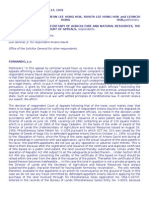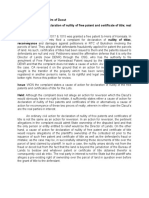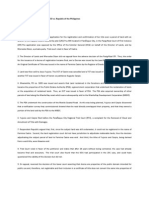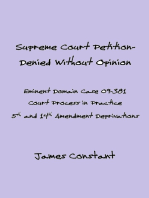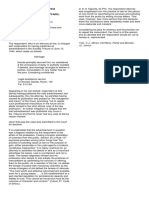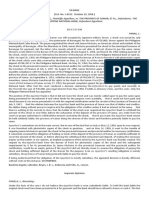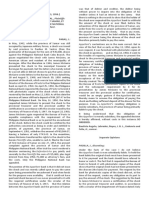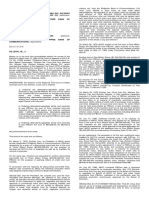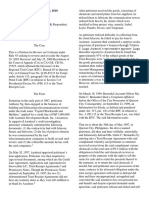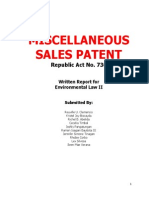0 ratings0% found this document useful (0 votes)
Lee Hong Kok V David
Lee Hong Kok V David
Uploaded by
jolly verbatimThis document is a court decision regarding a land dispute between Pedro Lee Hong Hok and others ("petitioners") and Aniano David ("respondent"). The Court of Appeals and lower court had ruled in favor of respondent, upholding the validity of the Torrens Title for the disputed land issued to respondent. The Supreme Court affirms this decision, finding that petitioners provided no evidence to support their claim to ownership of the land through accretion. The Court also rejects petitioners' argument that only the government can grant land, noting this principle has been established since a 1972 case. As petitioners had no ownership rights, they could not challenge respondent's legally issued land title.
Copyright:
© All Rights Reserved
Available Formats
Download as DOC, PDF, TXT or read online from Scribd
Download as doc, pdf, or txt
Lee Hong Kok V David
Lee Hong Kok V David
Uploaded by
jolly verbatim0 ratings0% found this document useful (0 votes)
This document is a court decision regarding a land dispute between Pedro Lee Hong Hok and others ("petitioners") and Aniano David ("respondent"). The Court of Appeals and lower court had ruled in favor of respondent, upholding the validity of the Torrens Title for the disputed land issued to respondent. The Supreme Court affirms this decision, finding that petitioners provided no evidence to support their claim to ownership of the land through accretion. The Court also rejects petitioners' argument that only the government can grant land, noting this principle has been established since a 1972 case. As petitioners had no ownership rights, they could not challenge respondent's legally issued land title.
Original Description:
LEE
Original Title
Lee Hong Kok v David
Copyright
© © All Rights Reserved
Available Formats
DOC, PDF, TXT or read online from Scribd
Share this document
Did you find this document useful?
Is this content inappropriate?
This document is a court decision regarding a land dispute between Pedro Lee Hong Hok and others ("petitioners") and Aniano David ("respondent"). The Court of Appeals and lower court had ruled in favor of respondent, upholding the validity of the Torrens Title for the disputed land issued to respondent. The Supreme Court affirms this decision, finding that petitioners provided no evidence to support their claim to ownership of the land through accretion. The Court also rejects petitioners' argument that only the government can grant land, noting this principle has been established since a 1972 case. As petitioners had no ownership rights, they could not challenge respondent's legally issued land title.
Copyright:
© All Rights Reserved
Available Formats
Download as DOC, PDF, TXT or read online from Scribd
Download as doc, pdf, or txt
0 ratings0% found this document useful (0 votes)
Lee Hong Kok V David
Lee Hong Kok V David
Uploaded by
jolly verbatimThis document is a court decision regarding a land dispute between Pedro Lee Hong Hok and others ("petitioners") and Aniano David ("respondent"). The Court of Appeals and lower court had ruled in favor of respondent, upholding the validity of the Torrens Title for the disputed land issued to respondent. The Supreme Court affirms this decision, finding that petitioners provided no evidence to support their claim to ownership of the land through accretion. The Court also rejects petitioners' argument that only the government can grant land, noting this principle has been established since a 1972 case. As petitioners had no ownership rights, they could not challenge respondent's legally issued land title.
Copyright:
© All Rights Reserved
Available Formats
Download as DOC, PDF, TXT or read online from Scribd
Download as doc, pdf, or txt
You are on page 1/ 2
G.R. No.
L-30389 December 27, 1972
PEDRO LEE HONG HOK, SIMEON LEE HONG HOK, ROSIT LEE
HONG HOK !"# LEON$IO LEE HONG HOK,petitioners,
vs.
NINO D%ID, THE HON. SE$RETR& O' GRI$(LT(RE ND
NT(RL RESO(R$ES, THE DIRE$TOR O' LNDS !"# $O(RT O'
PPELS, respondents.
Augusto A. Pardalis for petitioners.
Luis General, Jr. for respondent Aniano David.
Office of the Solicitor General for other respondents.
'ERNNDO, J.:p
Petitioners 1 in this appeal by certiorari would have us reverse a decision
of respondent Court of Appeals affirming a lower court judgment
dismissing their complaint to have the Torrens Title 2 of respondent Aniano
David declared null and void. What maes the tas for petitioners !uite
difficult is that their factual support for their pretension to ownership of such
disputed lot through accretion was rejected by respondent Court of
Appeals. Without such underpinning, they must perforce rely on a legal
theory, which, to put it mildly, is distinguished by unorthodo"y and is
therefore far from persuasive. A grant by the government through the
appropriate public officials 3 e"ercising the competence duly vested in
them by law is not to be set at naught on the premise, une"pressed but
implied, that land not otherwise passing into private ownership may not be
disposed of by the state. #uch an assumption is at war with settled
principles of constitutional law. $t cannot receive our assent. We affirm.
The decision of respondent Court of Appeals following that of the lower
court maes clear that there is no legal justification for nullifying the right of
respondent Aniano David to the disputed lot arising from the grant made in
his favor by respondent officials. As noted in the decision under review, he
%ac!uired lawful title thereby pursuant to his miscellaneous sales
application in accordance with which an order of award and for issuance of
a sales patent was made by the Director of &ands on 'une (), (*+),
covering &ot ,)*, containing an area of ,,- s!uare meters, which is a
portion of &ot ,)-. of the /aga Cadastre. 0n the basis of the order of
award of the Director of &ands the 1ndersecretary of Agriculture and
/atural 2esources issued on August ,-, (*+*, 3iscellaneous #ales
Patent /o. 45(,6* pursuant to which 0CT /o. +(6 was issued by the
2egister of Deeds of /aga City to defendant5appellee Aniano David on
0ctober ,(, (*+*. According to the #tipulation of 7acts, since the filing of
the sales application of Aniano David and during all the proceedings in
connection with said application, up to the actual issuance of the sales
patent in his favor, the plaintiffs5appellants did not put up any opposition or
adverse claim thereto. This is fatal to them because after the registration
and issuance of the certificate and duplicate certificate of title based on a
public land patent, the land covered thereby automatically comes under
the operation of 2epublic Act 8*- subject to all the safeguards provided
therein.... 1nder #ection .) of Act 8*- any !uestion concerning the validity
of the certificate of title based on fraud should be raised within one year
from the date of the issuance of the patent. Thereafter the certificate of title
based thereon becomes indefeasible.... $n this case the land in !uestion is
not a private property as the Director of &ands and the #ecretary of
Agriculture and /atural 2esources have always sustained the public
character thereof for having been formed by reclamation.... The only
remedy therefore, available to the appellants is an action for reconveyance
on the ground of fraud. $n this case we do not see any fraud committed by
defendant5appellant Aniano David in applying for the purchase of the land
involved through his 3iscellaneous #ales Application /o. 3#A545,-989,
entered in the records of the :ureau of &ands ;3iscellaneous #ales< =ntry
/o. 45*6.., because everything was done in the open. The notices
regarding the auction sale of the land were published, the actual sale and
award thereof to Aniano David were not clandestine but open and public
official acts of an officer of the >overnment. The application was merely a
renewal of his deceased wife?s application, and the said deceased
occupied the land since (*.).% )
0n such finding of facts, the attempt of petitioners to elicit a different
conclusion is liely to be attended with frustration. The first error assigned
predicated an accretion having taen place, notwithstanding its rejection
by respondent Court of Appeals, would see to disregard what was
accepted by respondent Court as to how the disputed lot came into being,
namely by reclamation. $t does not therefore call for any further
consideration. /either of the other two errors imputed to respondent Court,
as to its holding that authoritative doctrines preclude a party other than the
government to dispute the validity of a grant and the recognition of the
indefeasible character of a public land patent after one year, is possessed
of merit. Conse!uently, as set forth at the outset, there is no justification for
reversal.
(. 3ore specifically, the shaft of criticism was let loose by petitioner aimed
at this legal proposition set forth in the e"haustive opinion of then 'ustice
#alvador =sguerra of the Court of Appeals, now a member of this Court@
%There is, furthermore, a fatal defect of parties to this action. 0nly the
>overnment, represented by the Director of &ands, or the #ecretary of
Agriculture and /atural 2esources, can bring an action to cancel a void
certificate of title issued pursuant to a void patent A&ucas vs. Durian, (6,
Phil. ((+9B Director of &ands vs. Ceirs of Ciriaco Carlo, >.2. /o. &5(,8)+,
'uly .(, (*+*D. This was not done by said officers but by private parties
lie the plaintiffs, who cannot claim that the patent and title issued for the
land involved are void since they are not the registered owners thereof nor
had they been declared as owners in the cadastral proceedings of /aga
Cadastre after claiming it as their private property. The cases cited by
appellants are not in point as they refer to private registered lands or public
lands over which vested rights have been ac!uired but notwithstanding
such fact the &and Department subse!uently granted patents to public
land applicants.% * Petitioner ought to have nown better. The above
e"cerpt is invulnerable to attac. $t is a restatement of a principle that dates
bac to Maninang v. Consolacion, + a (*6) decision. As was there
categorically stated@ %The fact that the grant was made by the government
is undisputed. Whether the grant was in conformity with the law or not is a
!uestion which the government may raise, but until it is raised by the
government and set aside, the defendant can not !uestion it. The legality
of the grant is a !uestion between the grantee and the government.% 7 The
above citation was repeated ipsissimis veris inSala!ar v. Court of
Appeals. 8 :ereft as petitioners were of the right of ownership in
accordance with the findings of the Court of Appeals, they cannot, in the
language of "e#es v. "odrigue!, 9 %!uestion the ;title< legally
issued.%10 The second assignment of error is thus disposed of.
,. As there are overtones indicative of septicism, if not of outright
rejection, of the well5nown distinction in public law between the
government authority possessed by the state which is appropriately
embraced in the concept of sovereignty, and its capacity to own or ac!uire
property, it is not inappropriate to pursue the matter further. The former
comes under the heading of imperium and the latter of dominium. The use
of this term is appropriate with reference to lands held by the state in its
proprietary character. $n such capacity, it may provide for the e"ploitation
and use of lands and other natural resources, including their disposition,
e"cept as limited by the Constitution. Dean Pound did spea of the
confusion that e"isted during the medieval era between such two
concepts, but did note the e"istence of res pulicae as a corollary
to dominium.% 11 As far as the Philippines was concerned, there was a
recognition by 'ustice Colmes in Cari$o v. %nsular Government, 12 a case
of Philippine origin, that %#pain in its earlier decrees embodied the
universal feudal theory that all lands were held from the Crown....% 13 That
was a manifestation of the concept of &ura regalia, 1) which was adopted
by the present Constitution, ownership however being vested in the state
as such rather than the head thereof. What was stated by Colmes served
to confirm a much more e"tensive discussion of the matter in the leading
case of 'alenton v. Murciano, 1* decided in (*68. 0ne of the royal
decrees cited was incorporated in the 2ecopilacion de &eyes de las
$ndias 1+ in these words@ %We having ac!uired full sovereignty over the
$ndies and all lands, territories, and possessions not heretofore ceded
away by our royal predecessors, or by us, or in our name, still pertaining to
the royal crown and patrimony, it is our will that all lands which are held
without proper and true deeds of grant be restored to us according as they
belong to us, in order that after reserving before all what to us or to our
viceroys audiences, and governors may seem necessary for public
s!uares, ways, pastures, and commons in those places which are
peopled, taing into consideration not only their present condition, but also
their future and their probable increase, and after distributing to the natives
what may be necessary for tillage and pasturage, confirming them in what
they now have and giving them more if necessary, all the rest of said lands
may remain free and unencumbered for us to dispose of as we may
wish.% 17
$t could therefore be affirmed in 3ontano v. $nsular >overnment% 18 that
%as to the unappropriated public lands constituting the public domain the
sole power of legislation is vested in Congress, ...% 19 They continue to
possess that character until severed therefrom by state grant. 20 Where,
as in this case, it was found by the Court of Appeals that the disputed lot
was the result of reclamation, its being correctly categoriEed as public land
is undeniable. 21 What was held in Ceirs of Datu Pendatun v. Director of
Lands 22 finds application. Thus@ %There being no evidence whatever that
the property in !uestion was ever ac!uired by the applicants or their
ancestors either by composition title from the #panish >overnment or by
possessory information title or by any other means for the ac!uisition of
public lands, the property must be held to be public domain.% 23 7or it is
well5settled %that no public land can be ac!uired by private persons without
any grant, e"press or implied, from the government.% 2) $t is indispensable
then that there be a showing of a title from the state or any other mode of
ac!uisition recogniEed by law. 2* The most recent restatement of the
doctrine, found in an opinion of 'ustice '.:.&. 2eyes, follows@ 2+ %The
applicant, having failed to establish his right or title over the northern
portion of &ot /o. 8-. involved in the present controversy, and there being
no showing that the same has been ac!uired by any private person from
the >overnment, either by purchase or by grant, the property is and
remains part of the public domain.% 27 To repeat, the second assignment
of error is devoid of merit.
.. The last error assigned would tae issue with this portion of the opinion
of 'ustice =sguerra@ %According to the #tipulation of 7acts, since the filing
of the sales application of Aniano David and during all the proceedings in
connection with said application, up to the actual issuance of the sales
patent in his favor, the
plaintiffs5appellants did not put up any opposition or adverse claim thereto.
This is fatal to them because after the registration and issuance of the
certificate and duplicate certificate of title based on a public land patent,
the land covered thereby automatically comes under the operation of
2epublic Act 8*- subject to all the safeguards provided therein ... 1nder
#ection .) of Act 8*- any !uestion concerning the validity of the certificate
of title based on fraud should be raised within one year from the date of
the issuance of the patent. Thereafter the certificate of title based thereon
becomes indefeasible ...% 28 Petitioners cannot reconcile themselves to
the view that respondent David?s title is impressed with the !uality of
indefeasibility. $n thus manifesting such an attitude, they railed to accord
deference to controlling precedents. As far bac as (*(*, in A(uino v.
Director of
Lands, 29 'ustice 3alcolm, speaing for the Court, stated@ %The
proceedings under the &and 2egistration &aw and under the provisions of
Chapter 4$ of the Public &and &aw are the same in that both are against
the whole world, both tae the nature of judicial proceedings, and for both
the decree of registration issued is conclusive and final.%30 #uch a view
has been followed since then. 31 The latest case in point is Caacug v.
Lao. 32 There is this revealing e"cerpt appearing in that decision@ %$t is
said, and with reason, that a holder of a land ac!uired under a free patent
is more favorably situated than that of an owner of registered property. /ot
only does a free patent have a force and effect of a Torrens Title, but in
addition the person to whom it is granted has liewise in his favor the right
to repurchase within a period of five years.% 33 $t is !uite apparent,
therefore, that petitioners? stand is legally indefensible.
WC=2=702=, the decision of respondent Court of Appeals of 'anuary .(,
(*-* and its resolution of 3arch (8, (*-* are affirmed. With costs against
petitioners5appellants.
Lee Ho", Ko- ./. D!.0#
G.R. No. L-30389, Dec. 27, 1972
Distinction between $3P=2$13 and D03$/$13
0nly the government can !uestion a void certificate of title
issued pursuant to a government grant.
'$TS1
This is regarding a piece of land which Aniano David ac!uired lawful title
thereto, pursuant to his miscellaneous salesapplication. After approval of
his application, the Director of &ands issued an order of award and
issuance of sales patent, covering said lot by virtue of which the
1ndersecretary of Agriculture and /atural 2esources issued a
3iscellaneous #ales Patent. The 2egister of Deeds then issued
an original certificate of title to David.
During all this time, &ee Cong Fo did not oppose nor file any adverse
claim.
ISS(E1
Whether or not &ee Cong Fo may !uestion the government
grant
HELD1
0nly the >overnment, represented by the Director of &ands or
the #ecretary of Agriculture and /atural 2esources, can bring an action to
cancel a void certificate of title issued pursuant to a void patent. This was
not done by said officers but by private parties lie the plaintiffs, who
cannot claim that the patent and title issued for the land involved are void
since they are not the registered owners thereof nor had they been
declared as owners in the cadastral proceedings after claiming it as their
private property.
The fact that the grant was made by the government is undisputed.
Whether the grant was in conformity with the law or not is a !uestion which
the government may raise, but until it is raised by the government and set
aside, the defendantcannot !uestion it. The legality of the grant is a
!uestion between the grantee and the government.
$3P=2$13 vs. D03$/$13@
The government authority possessed by the #tate which is appropriately
embraced int eh concept of sovereignty comes under the heading of
imperiumB its capacity to own or ac!uire property under dominium. The use
of this term is appropriate with reference to lands held by the #tate in its
proprietary character. $n such capacity, it may provide for the e"ploitation
and use of lands and other natural resources, including their disposition,
e"cept as limited by the Constitution.
You might also like
- A Method To Obtain An Allodial Title To Your Property100% (5)A Method To Obtain An Allodial Title To Your Property2 pages
- Notice of Certificate of Acceptance of Declaration of Land Patent100% (2)Notice of Certificate of Acceptance of Declaration of Land Patent3 pages
- Guyland LLC's Memo in Opposition To The Motion To Set Aside Default JudgementNo ratings yetGuyland LLC's Memo in Opposition To The Motion To Set Aside Default Judgement24 pages
- Common Law Land Patent (Trust) Notice D. W. 2013100% (2)Common Law Land Patent (Trust) Notice D. W. 201310 pages
- Pedro Lee Hong Hok V Aniano David G.R. No. L-30389 PDFNo ratings yetPedro Lee Hong Hok V Aniano David G.R. No. L-30389 PDF5 pages
- Lee Hoong Hok v. David GR No L-30389 Dec 27, 1972No ratings yetLee Hoong Hok v. David GR No L-30389 Dec 27, 19724 pages
- Augusto A. Pardalis For Petitioners. Luis General, Jr. For Respondent Aniano David. Office of The Solicitor General For Other RespondentsNo ratings yetAugusto A. Pardalis For Petitioners. Luis General, Jr. For Respondent Aniano David. Office of The Solicitor General For Other Respondents5 pages
- Augusto A. Pardalis For Petitioners. Luis General, Jr. For Respondent Aniano David. Office of The Solicitor General For Other RespondentsNo ratings yetAugusto A. Pardalis For Petitioners. Luis General, Jr. For Respondent Aniano David. Office of The Solicitor General For Other Respondents30 pages
- Augusto A. Pardalis For Petitioners. Luis General, Jr. For Respondent Aniano David. Office of The Solicitor General For Other RespondentsNo ratings yetAugusto A. Pardalis For Petitioners. Luis General, Jr. For Respondent Aniano David. Office of The Solicitor General For Other Respondents46 pages
- Republic of The Philippines Manila en Banc: Supreme CourtNo ratings yetRepublic of The Philippines Manila en Banc: Supreme Court18 pages
- Augusto A. Pardalis For Petitioners. Luis General, Jr. For Respondent Aniano David. Office of The Solicitor General For Other RespondentsNo ratings yetAugusto A. Pardalis For Petitioners. Luis General, Jr. For Respondent Aniano David. Office of The Solicitor General For Other Respondents5 pages
- G.R. No. L-30389 December 27, 1972 PEDRO LEE HONG HOK vs. ANIANO DAVIDNo ratings yetG.R. No. L-30389 December 27, 1972 PEDRO LEE HONG HOK vs. ANIANO DAVID3 pages
- Survey of 2010 Decisions in Land Titles and DeedsNo ratings yetSurvey of 2010 Decisions in Land Titles and Deeds15 pages
- REPUBLIC OF THE PHILIPPINES, Petitioner, vs. The Honorable Court of Appeals and CORAZON NAGUIT, RespondentsNo ratings yetREPUBLIC OF THE PHILIPPINES, Petitioner, vs. The Honorable Court of Appeals and CORAZON NAGUIT, Respondents52 pages
- Lee Hong Kok vs. David G.R. No. L-30389, Dec. 27, 1972sNo ratings yetLee Hong Kok vs. David G.R. No. L-30389, Dec. 27, 1972s5 pages
- Petitioner vs. vs. Respondents The Solicitor General Godofredo Manipod Caluntad-Alfaro & AssociateNo ratings yetPetitioner vs. vs. Respondents The Solicitor General Godofredo Manipod Caluntad-Alfaro & Associate9 pages
- Augusto A. Pardalis For Petitioners. Luis General, Jr. For Respondent Aniano David. Office of The Solicitor General For Other RespondentsNo ratings yetAugusto A. Pardalis For Petitioners. Luis General, Jr. For Respondent Aniano David. Office of The Solicitor General For Other Respondents65 pages
- 124631-1998-Titong v. Court of Appeals20211018-12-1z0egv8No ratings yet124631-1998-Titong v. Court of Appeals20211018-12-1z0egv811 pages
- Custom Search: Today Is Thursday, April 09, 2020No ratings yetCustom Search: Today Is Thursday, April 09, 20206 pages
- 1 Acap vs. Court of Appeals, 66 Scad 359, 251 Scra 30 (1995) .No ratings yet1 Acap vs. Court of Appeals, 66 Scad 359, 251 Scra 30 (1995) .4 pages
- Insurance Services and Commercial Traders, Inc. v. Court of Appeals, G.R. No. 109305, October 2, 2000, 341 SCRA 572, 580.No ratings yetInsurance Services and Commercial Traders, Inc. v. Court of Appeals, G.R. No. 109305, October 2, 2000, 341 SCRA 572, 580.7 pages
- Joventino A. Cornista For Petitioner. Yolanda Quisumbing-Javellana & Associates For Private RespondentNo ratings yetJoventino A. Cornista For Petitioner. Yolanda Quisumbing-Javellana & Associates For Private Respondent13 pages
- Supreme Court: Bartolome Guirao and Antonio M. Orara For Petitioners. Gonzales and Fernandez For RespondentsNo ratings yetSupreme Court: Bartolome Guirao and Antonio M. Orara For Petitioners. Gonzales and Fernandez For Respondents3 pages
- Obligations and Contracts - Case Digests Batch 2 - Compliance With ObligationsNo ratings yetObligations and Contracts - Case Digests Batch 2 - Compliance With Obligations6 pages
- Supreme Court Eminent Domain Case 09-381 Denied Without OpinionFrom EverandSupreme Court Eminent Domain Case 09-381 Denied Without OpinionNo ratings yet
- California Supreme Court Petition: S173448 – Denied Without OpinionFrom EverandCalifornia Supreme Court Petition: S173448 – Denied Without Opinion4/5 (1)
- Patent Laws of the Republic of Hawaii and Rules of Practice in the Patent OfficeFrom EverandPatent Laws of the Republic of Hawaii and Rules of Practice in the Patent OfficeNo ratings yet
- Negotiable Instruments Case Digest: Bataan Cigar V. CA (1994) Full Case ResearchNo ratings yetNegotiable Instruments Case Digest: Bataan Cigar V. CA (1994) Full Case Research4 pages
- McGuire Vs Province of Samar, GR L-8155, Oct. 23, 1956 CaseNo ratings yetMcGuire Vs Province of Samar, GR L-8155, Oct. 23, 1956 Case2 pages
- McGuire Vs Province of Samar, GR L-8155, Oct. 23, 1956 Full CaseNo ratings yetMcGuire Vs Province of Samar, GR L-8155, Oct. 23, 1956 Full Case2 pages
- Wong vs. Court of Appeals (GR 117857, 2 February 2001) The Full Case ResearchNo ratings yetWong vs. Court of Appeals (GR 117857, 2 February 2001) The Full Case Research6 pages
- Doctrines of Cases in Securities Regulation CodeNo ratings yetDoctrines of Cases in Securities Regulation Code1 page
- 1.metropolitan Bank & Trust Company vs. TondaNo ratings yet1.metropolitan Bank & Trust Company vs. Tonda4 pages
- Today Is Friday, February 17, 2017: Supreme CourtNo ratings yetToday Is Friday, February 17, 2017: Supreme Court6 pages
- Law and Legal Definitions For Consideration and Study: Great Seal National Association of Moorish Affairs100% (2)Law and Legal Definitions For Consideration and Study: Great Seal National Association of Moorish Affairs2 pages
- MISCELLANEOUS SALES PATENT - Written ReportNo ratings yetMISCELLANEOUS SALES PATENT - Written Report14 pages
- Acquisition of Ownership in Any Other Manner Provided For by Law Under Section 14 4No ratings yetAcquisition of Ownership in Any Other Manner Provided For by Law Under Section 14 42 pages
- CTK College - Syllabus (Natural Resources & Enviromental Laws)No ratings yetCTK College - Syllabus (Natural Resources & Enviromental Laws)36 pages
- Memorandum of Law: History, Force & Effect of The Land Patent100% (1)Memorandum of Law: History, Force & Effect of The Land Patent29 pages
- Land Patent Williamson County Property in PDFNo ratings yetLand Patent Williamson County Property in PDF1 page
















